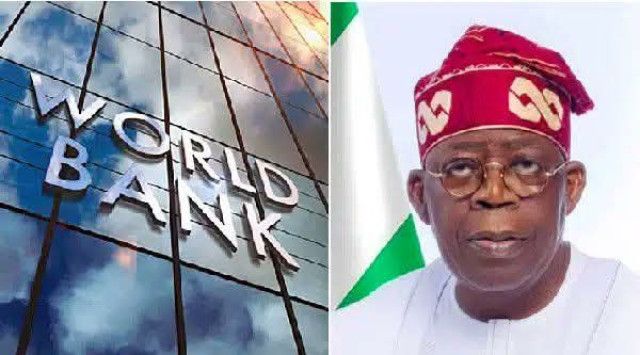ABUJA, Nigeria - The World Bank expressed approval of the federal government on Monday, noting that the ongoing reforms by the Bola Ahmed Tinubu administration have improved Nigeria’s macroeconomic landscape.
This information was highlighted in the latest Nigeria Development Update (NDU) report released in Abuja.
The report, titled “Building Momentum for Inclusive Growth,” indicated that Nigeria's economic growth in the fourth quarter of 2024 rose to 4.6% year-on-year, bringing the total growth for 2024 to 3.4%, the highest level since 2014 (excluding the COVID-19 rebound of 2021-2022).
The recent reforms have also contributed to the stability of the foreign exchange (FX) market and Nigeria’s external balance. In 2024, the overall fiscal situation improved, aided by increased revenues.
The fiscal deficit decreased from 5.4% of GDP in 2023 to 3.0% of GDP in 2024, a significant improvement attributed to a notable rise in total Federation revenues, which went from N16.8 trillion in 2023 (7.2% of GDP) to an estimated N31.9 trillion in 2024 (11.5% of GDP).
According to the Washington-based institution, inflation remains high and persistent, with projections indicating it will average 22.1% annually in 2025, as sustained tight monetary policies are expected to enhance policy credibility and reduce inflationary expectations.
The report emphasizes the necessity of consolidating macroeconomic stability while promoting inclusive growth through deeper, broader structural reforms. It stresses the need for the economy to create more and better jobs on a larger scale to alleviate poverty.
In his comments on the report, Taimur Samad, the Acting World Bank Country Director for Nigeria, remarked that the country is gradually regaining macroeconomic stability that will ultimately facilitate development. He stated, “Nigeria has made significant progress in restoring macroeconomic stability. With improved fiscal conditions, Nigeria now has a unique chance to enhance the quality and quantity of development spending, focusing more on human capital, social protection, and infrastructure.”
Samad also noted that public spending patterns could begin to shift from previous unsustainable models towards addressing Nigeria’s significant developmental needs, with the government serving as a crucial provider of basic public services and a facilitator of private sector-led growth.
The NDU report further discussed the goal of achieving a $1 trillion economy by 2030 and the necessity for accelerated growth and a balanced focus on economically productive sectors capable of creating considerable employment opportunities for the poor and economically vulnerable.
The World Bank acknowledged that while the finance and ICT sectors are key growth drivers, they do not provide mass employment since many Nigerians lack the skills and opportunities to engage with these sectors.
It proposed that inclusive growth can be enhanced through a strategy led by the private sector but facilitated by the public sector. Essential strategies to achieve this include addressing significant infrastructure deficits in electricity and transportation, promoting healthy competition and improving the business environment to foster dynamism, enhancing financial access for firms, and refining policies in critical sectors to unlock their potential.
Highlighting the public sector's role, Alex Sienaert, World Bank Lead Economist for Nigeria, stated that the public sector alone cannot generate sustainable growth and jobs, emphasizing that a viable strategy is for the public sector to deliver essential services while enabling private sector investment and innovation.
During the event, Minister of Finance and Coordinating Minister of the Economy, Wale Edun, emphasized the noted improvements in transparency within the Nigerian National Petroleum Company Limited (NNPC Ltd), asserting that the ongoing forensic audit allows states to receive their rightful FAAC allocations.
Central Bank of Nigeria (CBN) Governor Olayemi Cardoso assured that the Apex Bank would persist in its efforts to maintain economic stability. “We will strive to safeguard the economy while being proactive. Our current measures are intended to stabilize the FX rate, and we closely monitor this with a focus on price stability. While inflation remains elevated, continued adherence to this policy should lead to moderation over time for inflation and interest rates,” Cardoso stated.
He added, “As a result of the reforms, growth opportunities will eventually benefit those vulnerable groups. We are enhancing the systems that facilitate this, and it’s crucial to communicate the improvements that are occurring. The indicators show progress. For investors, there are no hidden aspects; transparency is being established. Diversification is gradually occurring with reduced dependency on oil imports. The CBN has built resilience and increased buffers.”
“We aim to establish a robust financial system suited for our needs. We have committed to this vision and are focused on bolstering the fintech sector. As a regulatory body, we will support fintech and soon hold a summit on financial inclusion. We want a growing economy where no one is left behind,” he concluded.




















